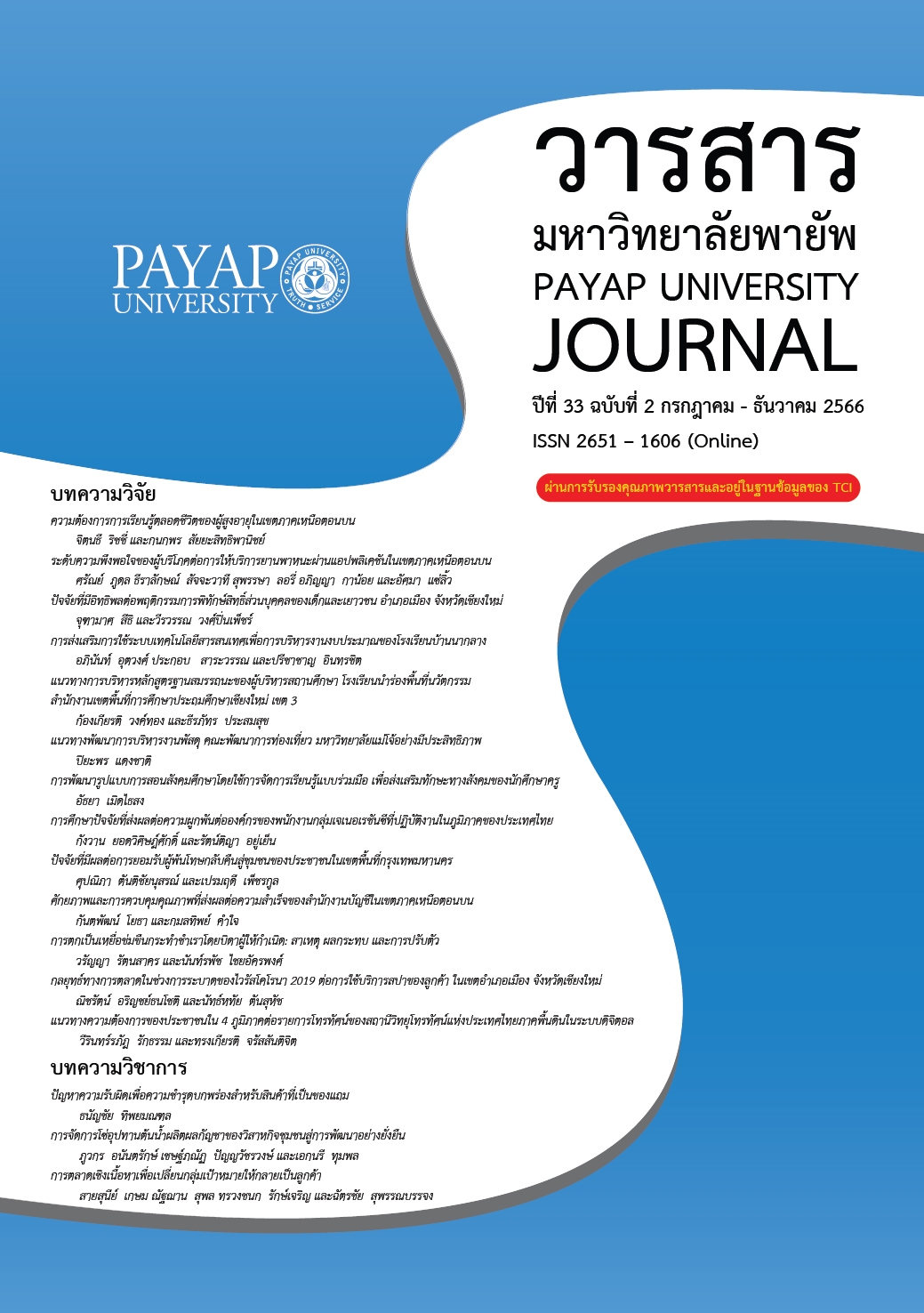การพัฒนารูปแบบการสอนสังคมศึกษาโดยใช้การจัดการเรียนรู้แบบร่วมมือ เพื่อส่งเสริมทักษะทางสังคมของนักศึกษาครู
Main Article Content
บทคัดย่อ
การวิจัยนี้มีวัตถุประสงค์เพื่อพัฒนารูปแบบการสอนสังคมศึกษาและประเมินผลการใช้รูปแบบการสอนสังคมศึกษาโดยใช้การเรียนรู้แบบร่วมมือเพื่อส่งเสริมทักษะทางสังคมของนักศึกษาครู กลุ่มตัวอย่าง คือ นักศึกษาสาขาสังคมศึกษา ชั้นปีที่ 3 ที่ลงทะเบียนในรายวิชาวิธีวิทยาการสอนสังคมศึกษา ปีการศึกษา 2/2565 จำนวน 55 คน เครื่องมือที่ใช้ในการวิจัย คือ 1) แผนการจัดการเรียนรู้แบบร่วมมือเพื่อส่งเสริมทักษะทางสังคม 2) แบบประเมินทักษะทางสังคม และ 3) แบบวัดความคิดเห็นเกี่ยวกับรูปแบบการสอนสังคมศึกษาโดยใช้การเรียนรู้แบบร่วมมือเพื่อส่งเสริมทักษะทางสังคม วิเคราะห์ข้อมูลโดยใช้ ค่าเฉลี่ย ค่าเบี่ยงเบนมาตรฐาน สถิติ t-test แบบ dependent
ผลการวิจัย พบว่า การพัฒนารูปแบบการสอนสังคมศึกษาโดยใช้การจัดการเรียนรู้แบบร่วมมือเพื่อส่งเสริมทักษะทางสังคมที่พัฒนาขึ้น มี 5 องค์ประกอบ ได้แก่ 1) หลักการ 2) วัตถุประสงค์ 3) การจัดกิจกรรมการเรียนรู้ 3 ขั้น IPPR Model คือ ขั้นเตรียมการและสร้างปฏิสัมพันธ์ ขั้นปฏิบัติงานร่วมกัน และขั้นสะท้อนประเมินผล 4) สื่อการเรียนรู้ และ 5) การวัดประเมินผล สำหรับผลการประเมินการใช้รูปแบบการสอนสังคมศึกษา พบว่า ทักษะทางสังคมของนักศึกษามีคะแนนหลังเรียน ( = 88.40) สูงกว่าก่อนเรียน (
= 77.64) อย่างมีนัยสำคัญทางสถิติที่ระดับ .05 รวมทั้งผู้เรียนมีความคิดเห็นต่อรูปแบบการสอนสังคมศึกษาโดยใช้การเรียนรู้แบบร่วมมือเพื่อส่งเสริมทักษะทางสังคม ภาพรวมอยู่ในระดับมากมีค่าเฉลี่ยเท่ากับ 4.45 (S.D. = 0.62)
Article Details
เอกสารอ้างอิง
กาญจนา พงษ์สุภา. (2561). การพัฒนาทักษะทางสังคมของเด็กปฐมวัยเรื่องการทำขนมไทย. วารสารศึกศาสตร์ มหาวิทยาลัยมหาสารคาม, 12(3), 7-17.
ปวินญาพัฒน์ วรพันธ์, ชัยรัตน์ โตศิลา, และอัญชลี สุขในสิทธิ์. (2565). แนวทางการจัดการเรียนรู้สังคมศึกษาเพื่อพัฒนาทักษะทางสังคมของนักเรียนมัธยมศึกษาตอนปลาย. Journal of Roi Kaensarn Academi, 7(2), 283-294. https://so02.tci-thaijo.org/index.php/JRKSA/article/view/252533/171467
ภานุมาศ หอมบุญยงค์. (2562). แนวทางการพัฒนาทักษะทางสังคมของนักเรียนชั้นมัธยมศึกษาปีที่6 สังกัดสำนักงานเขตพื้นที่การศึกษามัธยมศึกษาเขต10ในจังหวัดสมุทรสงคราม [วิทยานิพนธ์ศึกษาศาสตรมหาบัณฑิต, มหาวิทยาลัยศิลปากร]. http://ithesis-ir.su.ac.th/dspace/bitstream/123456789/2742/1/59260303.pdf
โยธิน มาศสุข. (2565). การจัดการเรียนการสอนของครูสังคมศึกษา ศาสนา และวัฒนธรรมโดยใช้วิธีการเรียนรู้แบบร่วมมือ. วารสารมจร พุทธโสธรปริทรรศน์, 2(2), 120-134. https://so02.tci-thaijo.org/index.php/JMBR_sothorn/article/view/257943/174749
ลัดดาวัลย์ จิ่มอาษา. (2562). การพัฒนารูปแบบการจัดการเรียนรู้วิชาสังคมศึกษา ส31101 โดยใช้ทฤษฎีคอนสตรัคติวิสต์ร่วมกับรูปแบบการสอนโดยใช้ผังกราฟิก เพื่อพัฒนาการคิดวิเคราะห์ สำหรับนักเรียนชั้นมัธยมศึกษาปีที่4. วารสารบัณฑิตศึกษา, 16(75), 139-149.
วลัย อิศรางกูร ณ อยุธยา. (2555). ครูสังคมศึกษากับการพัฒนาทักษะแก่นักเรียน. คณะครุศาสตร์ จุฬาลงกรณ์มหาวิทยาลัย.
สิริวรรณ ศรีพหล. (2559). การพัฒนารูปแบบการจัดการเรียนรู้ความเป็นพลเมืองดีของนักเรียนตามหลักปรัชญาของเศรษฐกิจพอเพียงสำหรับครูสังคมศึกษา. วารสารวิจัยและพัฒนาหลักสูตร, 6(2), 24-48.
สุปรียา ไผ่ล้อม. (2563). การศึกษาผลการจัดการเรียนรู้และความพึงพอใจของนักเรียนชั้นประถมศึกษา ปีที่4 เรื่อง พลเมืองต้นแบบโดยใช้วิธีการสอนแบบร่วมมือรูปแบบร่วมเรียนรู้ (Learning Together: LT). วารสารเทคโนโลยีและสื่อสารการศึกษา คณะศึกษาศาสตร์ มหาวิทยาลัยมหาสารคาม, 3(7), 125-137. https://so02.tci- thaijo.org/index.php/etcedumsujournal/article/view/242226/164425
อาภรณ์ ใจเที่ยง. (2550). หลักการสอน (พิมพ์ครั้งที่ 4). โอเดียนสโตร์.
อุเทน วางหา. (2560). การพัฒนารูปแบบการเรียนการสอนสังคมศึกษาโดยประยุกต์แนวคิดชุมชนเป็นฐานการเรียนรู้และทฤษฏีการสร้างความรู้เพื่อส่งเสริมความสามารถในการคิดวิเคราะห์และความสามารถในการสื่อสารของนักเรียนชั้นมัธยมศึกษาปีที่3 ในโรงเรียนสังกัดองค์กรปกครองท้องถิ่น [การศึกษาดุษฎีบัณฑิต, มหาวิทยาลัยบูรพา]. ThaiLIS Digital Collection.
Cronbach, L. J. (1990). Essentials of psychological testing. (5th ed.). Harper & Row.
Johnson, D. W., & Johnson, R. T. (1974). Instructional goal structure: Cooperative competitive, or individualistic. Review of Educational Research, 44(2), 213–240. https://journals.sagepub.com/doi/10.3102/00346543044002213
Kay, K. (2010). 21st century skills: Why they matter, what they are, and how we get there. In Bellanca J., & Brandt, R. (Eds.), 21st century skills: Rethinking how students learn (pp.13-18). Solution Tree Press. http://dspace.vnbrims.org:13000/jspui/bitstream/123456789/4209/1/21st%20Century%20Skills%20Rethinking%20How%20Students%20Learn.pdf


